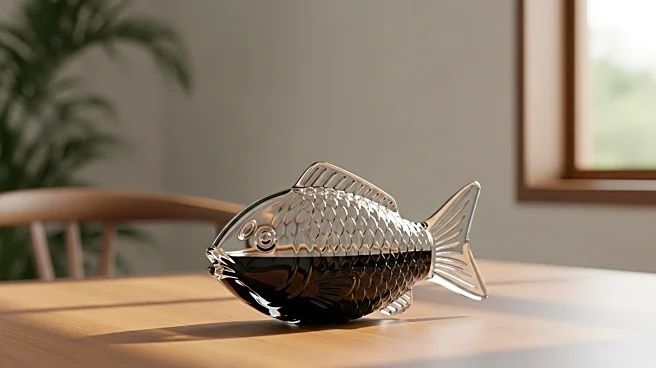What is the story about?
What's Happening?
South Australia has enacted a ban on plastic soy sauce bottles shaped like fish, a popular item among sushi takeout consumers. This measure, effective from Monday, is part of the state's ongoing efforts to reduce plastic waste. The government has identified these containers as particularly harmful to the environment, as they are often mistaken for food by marine life when they end up in the ocean. Deputy Premier Susan Close highlighted that these bottles are frequently lost or improperly disposed of, leading to environmental pollution. Restaurants are now required to use larger bottles, refillable containers, or more environmentally friendly single-use alternatives. This ban is part of a broader initiative that began in 2009, with South Australia leading the country in comprehensive plastic waste reduction measures.
Why It's Important?
The ban on fish-shaped soy sauce bottles is significant as it represents a targeted approach to reducing plastic pollution, which is a major environmental concern globally. By eliminating these small, often unrecyclable items, South Australia is taking a step towards reducing the amount of plastic that ends up in landfills and oceans. This move could inspire other regions to adopt similar measures, contributing to a larger global effort to combat plastic waste. The initiative also highlights the role of local governments in driving environmental policy and the potential impact of such policies on consumer habits and industry practices.
What's Next?
Following the ban on fish-shaped soy sauce bottles, South Australia plans to extend its prohibition to other plastic items, including stickers on fresh produce. This change, initially set for 2025, has been delayed due to concerns from producers about increased costs and supply chain disruptions. The state's Environment Protection Authority will enforce the new regulations, with penalties ranging from warnings to prosecution for non-compliance. The ongoing expansion of plastic bans in South Australia may serve as a model for other regions seeking to address plastic pollution.
Beyond the Headlines
The ban on plastic soy sauce bottles in South Australia reflects a growing global trend towards reducing single-use plastics. This movement is driven by the environmental impact of plastic waste, which contributes to marine pollution and poses risks to wildlife and human health. The initiative underscores the importance of sustainable practices in the food industry and the potential for regulatory measures to drive change. As discussions for a global plastic pollution treaty continue, local actions like South Australia's may influence broader international policies.















